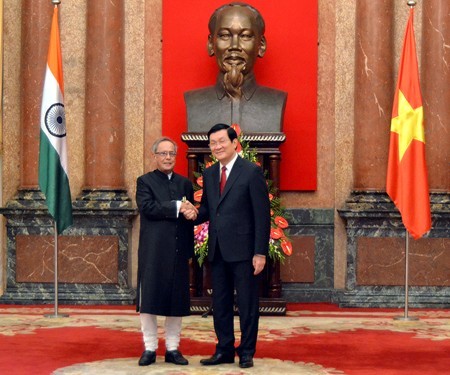Vietnam-India Joint Statement

Indian President Pranad Mukherjee and Vietnamese President Truong Tan Sang |
(VOVworld)- Vietnam and India have released a Joint Statement on Indian President Pranab Mukherjee’s visit to Vietnam. The Statement says the Indian President began a 4-day state visit to Vietnam on Sunday at the invitation of President Truong Tan Sang. India continues to consider Vietnam a pillar of its Look East policy. Vietnam reiterates its support for India’s Look East Policy and its increasingly important role in regional and global forums. The Statement emphasises that the two sides agreed to deepen bilateral cooperation on the basis of a strategic partnership with the focus on cooperation in politics, national defence, security, economics, science and technology, oil and gas, and culture, people-to-people connections and regional and multi-lateral cooperation. They agreed to strengthen cooperation within the framework of the Strategic Partnership, particularly the Inter-Governmental Committee, Political Consultation and Strategic Dialogue, Security Dialogue and other dialogue mechanisms between the two countries. They agreed to foster the implementation of signed agreements and that cooperation in national defence was an important pillar in their strategic partnership. Both sides appreciated the rapid growth in bilateral trade in recent years and asked their businesses to diversify trade activities to raise trade turnover to 15 billion USD by 2020. The two sides exchanged views on regional and international issues of mutual concern and reviewed their cooperation at international forums such as ASEAN, the ASEAN Regional Forum (ARF), the ASEAN Defense Ministers Meeting Plus (ADMM Plus), the East Asia Summit (EAS), the UN, and the non-aligned movement that benefited international peace, stability, and prosperity. Both sides underscored the need to reform the UN and increase the number of permanent and non-permanent members of the UN Security Council.
Both sides agreed that freedom of navigation in the East Sea must not be obstructed and called on relevant parties to practice restraint, avoid the threat or use of force, and resolve disputes by peaceful measures based on international law including the 1982 UNCLOS. The two countries appreciated commitments to abide by the Declaration on the Conduct of Parties in the East Sea towards the adoption of the Code of Conduct of Parties in the East Sea. The two sides called for cooperation to ensure marine security, combating pirates, and search and rescue at sea.